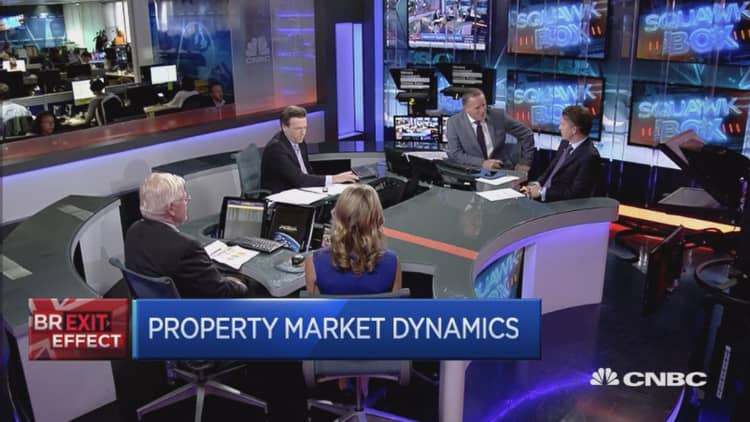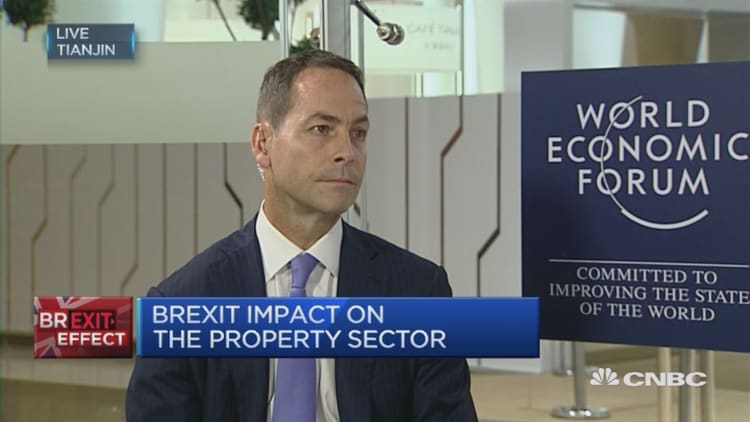


After prophesies of an 18 percent price plunge, analysts are contemplating which way the U.K. property market is actually heading following the U.K.'s decision to exit the European Union.
Despite the initial predictions the reality is much more prosaic … the sound of silence continues to echo around the offices of most estate agents. To quote one central London based intermediary, "Any agents who say their phones are ringing off the hook are lying."
CNBC has a behind-the-scenes look at what those on the frontline have seen since the referendum results:
From trickle to drip
Apart from periodic spikes caused by policy changes, overall momentum in the central London property market started to slow one to two years ago, with prime taking the earlier and greater hit.
A more severe gumming up of the market in recent months was partly attributed to uncertainty around the Brexit referendum itself, with participants hoping the outcome would revive transaction levels.
However, far from bringing certainty, the decision to leave has brought a whole new wave of uncertainty. According to Richard Donnell, research director at property analysts Hometrack: "The greatest impact of Brexit will be on turnover rather than prices and we expect volumes to be down 10-15 percent in the short term."
What uncertainty?
Firstly, political. Buyers are waiting to see who the new U.K. prime minister and finance minister are, and if the latter will keep, roll back or add to the policy changes brought in by current finance minister George Osborne to take some heat out of the market.
Secondly, while the chances of a Bank of England rate cut rose Thursday, some warn against expecting lenders to follow suit in the case of lower rates. Indeed, some see lenders actually tightening credit standards given the negative signalling about the country's economic strength a cut would imply.
Finally, given the correlation between jobs and wages and house prices – particularly, that between certain areas of London and City of London employment – all eyes are on what businesses, especially financial services firms, will do. Accordingly, Adam Challis, the head of residential research at estate agent Jones Lang LaSalle says, "buyers don't feel compelled to make decisions today, but are proceeding where pricing is sensible."
But sterling's so cheap
For some, relatively speaking, yes. With sterling still down over 11 percent since the decision, U.K. property has just become significantly more affordable for some.
Some agents reported this week that buyers with cash balances in dollar-pegged currencies were front of the queue looking to take advantage of the price movement and seeking to move rapidly in case there is a recovery in sterling. While only a niche buyer segment, this could lend short-term support to development properties given the quicker average time to completion than for second-hand properties.
Did failed transactions spike after Brexit?
It doesn't seem so. Despite rumours of "Brexit clauses" - giving buyers an out in the event of a leave vote - in reality, anecdotal evidence revealed limited examples of failed sales.
Jeremy McGivern, founder of Mercury Homesearch stated he knew of 11 out of 128 deals withdrawn on Friday after the referendum results. Other agents pointed to cancellations of viewings occurring in higher numbers than transactions falling through.
As Fionnuala Early, research director at Hamptons put it: "Early signs are that those already in the pipeline had factored in the risk of a Brexit and the result has made little difference."
However, those at earlier stages of the search may have felt more comfortable biding their time for now. Reports of some price negotiations taking place have also materialized.
When will the fog lift?
Expect this in two stages. RICS (Royal Institution of Chartered Surveyors) has pushed back its sentiment survey release to July 14h in the hope of getting a clearer picture. Tellingly, some normally vocal industry players requested a similar timeframe before offering a view.
There should therefore be a little more clarity in the next two weeks. For real illumination, however, it would be prudent to wait until after the new U.K. government is in place (September) and companies have given more clues as to their staffing intentions and business outlooks.


